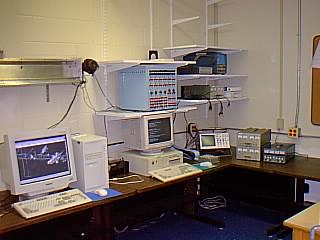Advanced Control Systems Lab
The advanced control systems lab was established to serve two purposes:
(1) to enable students to learn the practical side of  control
system design and implementation and (2) to provide platforms to test the
theoretical results obtained through the research efforts of the group's
faculty and students. The lab currently has two computer based control
implementation systems. The first is a data acquisition board (DAB) and
software installed on a 486 machine. The controller is implemented in software
using either state-space or transfer function representations. The data
acquisition board has sixteen inputs (i.e. system outputs such as sensor
signals) and four outputs (i.e. system inputs such as the control signal
for a motor). Four voltage-to-current converters (VCCs) have been built
to provide current drive for several DC motors. A switching box was built
to allow up to four experiments to be connected to the system and to allow
the outputs to be switched between up to four VCCs. The second control
implementation system is the state of the art dSPACE system running on a
Pentium 133 machine. This system has several advantages.
control
system design and implementation and (2) to provide platforms to test the
theoretical results obtained through the research efforts of the group's
faculty and students. The lab currently has two computer based control
implementation systems. The first is a data acquisition board (DAB) and
software installed on a 486 machine. The controller is implemented in software
using either state-space or transfer function representations. The data
acquisition board has sixteen inputs (i.e. system outputs such as sensor
signals) and four outputs (i.e. system inputs such as the control signal
for a motor). Four voltage-to-current converters (VCCs) have been built
to provide current drive for several DC motors. A switching box was built
to allow up to four experiments to be connected to the system and to allow
the outputs to be switched between up to four VCCs. The second control
implementation system is the state of the art dSPACE system running on a
Pentium 133 machine. This system has several advantages.
- The system is designed to be used with Matlab and Simulink for rapid
prototyping as follows. The system to be controlled is modeled using Matlab
and implemented as a block diagram in Simulink. The controller is then
designed in Matlab and also implemented in Simulink. The resulting closed-loop
system can then be simulated and the results used to improve the performance
of the controller. Block diagrams for the DAB inputs and outputs (from
the dSPACE toolbox) are then added to the Simulink model. The inputs and
outputs of the physical system are connected to the ports on the DAB. The
Simulink code is then translated into C++ code and cross-compiled into
DSP code. The DSP code is compiled, downloaded to the DSP, and run in real
time to control the physical system. Thus the entire process from system
identification through controller design and simulation to testing the
controller on the physical system is accomplished on the computer.
- Included in with the dSPACE system are two programs which allow the
user to view both input and output signals and to modify controller parameters
online and in real time while the system is controlling the physical system.
The data acquisition board has a Texas Instruments TMS320C31 floating point
digital signal processor (DSP) with 40 MHz clock speed mounted on the board.
This allows the controller speed to be independent of the PC processor.
The lab currently has three experiments: an inverted
pendulum, a flexible beam, and a slewed
flexible beam.
Return to Systems and Controls Research Group Home
Page .
 control
system design and implementation and (2) to provide platforms to test the
theoretical results obtained through the research efforts of the group's
faculty and students. The lab currently has two computer based control
implementation systems. The first is a data acquisition board (DAB) and
software installed on a 486 machine. The controller is implemented in software
using either state-space or transfer function representations. The data
acquisition board has sixteen inputs (i.e. system outputs such as sensor
signals) and four outputs (i.e. system inputs such as the control signal
for a motor). Four voltage-to-current converters (VCCs) have been built
to provide current drive for several DC motors. A switching box was built
to allow up to four experiments to be connected to the system and to allow
the outputs to be switched between up to four VCCs. The second control
implementation system is the state of the art dSPACE system running on a
Pentium 133 machine. This system has several advantages.
control
system design and implementation and (2) to provide platforms to test the
theoretical results obtained through the research efforts of the group's
faculty and students. The lab currently has two computer based control
implementation systems. The first is a data acquisition board (DAB) and
software installed on a 486 machine. The controller is implemented in software
using either state-space or transfer function representations. The data
acquisition board has sixteen inputs (i.e. system outputs such as sensor
signals) and four outputs (i.e. system inputs such as the control signal
for a motor). Four voltage-to-current converters (VCCs) have been built
to provide current drive for several DC motors. A switching box was built
to allow up to four experiments to be connected to the system and to allow
the outputs to be switched between up to four VCCs. The second control
implementation system is the state of the art dSPACE system running on a
Pentium 133 machine. This system has several advantages.